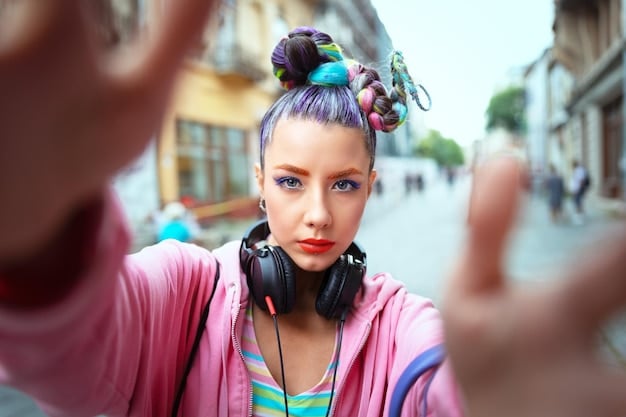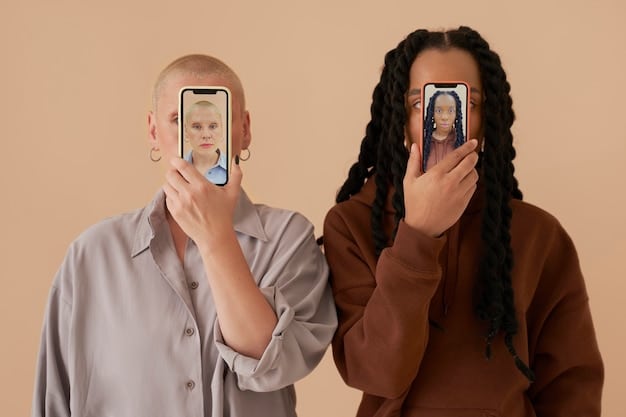AI Influencers: Are Virtual Personalities Dominating the US Market?

The rise of AI influencers in the US market signifies a paradigm shift in digital marketing, where virtual personalities, powered by artificial intelligence, are increasingly engaging audiences and reshaping brand strategies through innovative content creation and targeted interactions.
The digital landscape is constantly evolving, and one of the most intriguing recent developments is the **rise of AI influencers: Are virtual personalities taking over the US market?** These digitally created individuals are not just novelties; they are becoming significant players in marketing, advertising, and even social commentary, raising questions about authenticity, engagement, and the future of human-AI interaction.
Understanding the AI Influencer Phenomenon
AI influencers are computer-generated characters who possess realistic features, personalities, and backstories. They engage with audiences on social media platforms, promoting products, sharing opinions, and even participating in virtual events. But what exactly makes them so appealing to both brands and consumers?
The Anatomy of an AI Influencer
Unlike traditional influencers, AI influencers are entirely digital creations. They don’t exist in the physical world, yet they lead remarkably human-like lives online. Their appearances, behaviors, and content are carefully crafted to resonate with specific target audiences, making them highly controllable and predictable marketing assets.
Why Brands Are Turning to Virtual Influencers
Several factors contribute to the appeal of AI influencers for brands. First and foremost, they offer unparalleled control. Brands can dictate every aspect of their virtual ambassadors’ personalities, ensuring alignment with their messaging and values. Furthermore, AI influencers are available 24/7, immune to scandals, and capable of scaling their output to meet demand. This efficiency and reliability make them an attractive alternative to human influencers.
- Cost-effectiveness: AI influencers can be more budget-friendly than human influencers, especially for long-term campaigns.
- Brand Safety: The controlled nature of AI influencers mitigates the risk of unpredictable behavior or controversial statements.
- Scalability: AI influencers can handle a high volume of content and interactions without the limitations of human influencers.
In conclusion, the AI influencer phenomenon represents a significant evolution in digital marketing. By understanding the anatomy and appeal of these virtual personalities, brands can effectively leverage their potential to reach new audiences and drive engagement in innovative ways.
The Rise of Lil Miquela and Other Key Players
While the concept of AI influencers may seem futuristic, several virtual personalities have already achieved mainstream recognition. One of the most prominent examples is Lil Miquela, a digital character created by Brud, a Los Angeles-based startup. She has millions of followers on Instagram and has collaborated with major brands such as Prada and Calvin Klein. But who else is making waves in this emerging field?
Lil Miquela: The Pioneer Virtual Influencer
Lil Miquela is arguably the most well-known AI influencer, boasting a massive following and a highly engaged audience. Her success lies in her ability to blur the lines between reality and virtuality, creating a compelling narrative that resonates with millennials and Gen Z. She has become a fashion icon, a music artist, and a social activist, all while remaining entirely digital.
Other Notable Virtual Influencers
Besides Lil Miquela, several other AI influencers have emerged as key players in the US market. Shudu Gram, for example, is a virtual supermodel created by British photographer Cameron-James Wilson. She has appeared in campaigns for Balmain and other high-end brands. Imma, a virtual model from Japan, has also gained popularity for her hyperrealistic appearance and trendy fashion sense.

- Noonoouri: A digital cartoon character who partners with luxury fashion brands.
- Bermuda: An AI influencer who is portrayed as Lil Miquela’s rival.
- Liam Nikuro: A male AI influencer who focuses on fashion and lifestyle content.
These virtual influencers are not simply static images; they evolve over time, interact with their followers, and participate in ongoing narratives. Their ability to adapt and innovate makes them valuable assets for brands seeking to stay ahead of the curve.
Ethical Considerations and Concerns
The rise of AI influencers raises several ethical considerations and concerns. One of the most pressing issues is the potential for deception and manipulation. Are consumers fully aware that they are engaging with a digital character, or do they perceive AI influencers as real people? It’s crucial to address these challenges to ensure transparency and trustworthiness in the age of virtual influence.
Transparency and Disclosure
Many critics argue that brands and AI influencers should be transparent about their artificial nature. Consumers have a right to know whether they are interacting with a real person or a computer-generated character. Clear disclosure policies can help to prevent confusion and maintain trust.
The Impact on Human Influencers
The increasing popularity of AI influencers also raises concerns about their potential impact on human influencers. Will virtual personalities eventually replace real people in the realm of digital marketing? It’s essential to consider the economic and social implications of this shift, particularly for content creators who rely on their online presence for income.
In summary, ethical considerations and concerns surrounding AI influencers are paramount to ensure responsible and transparent practices in the digital marketing landscape. Open discussions and clear guidelines are essential to navigate the evolving world of virtual influence responsibly.
The Psychological Impact on Consumers
Beyond ethical considerations, the rise of AI influencers also has potential psychological implications for consumers. How do these virtual personalities affect self-esteem, body image, and consumer behavior? It’s essential to understand the nuances of human-AI interaction to ensure that these technologies are used in a responsible and ethical manner.
The Illusion of Perfection
AI influencers are often designed to be physically attractive, stylish, and successful. This can create an illusion of perfection that may negatively impact consumers’ self-esteem and body image. It’s crucial to promote diversity and inclusivity in the virtual world to counteract these effects.
The Formation of Parasocial Relationships
Consumers often form parasocial relationships with influencers, developing a sense of connection and intimacy with individuals they have never met in person. This phenomenon can be even more pronounced with AI influencers, as their personalities are specifically engineered to foster engagement and loyalty.

- Unrealistic Expectations: AI influencers can set unrealistic standards for appearance, lifestyle, and success.
- Emotional Manipulation: The engineered personalities of AI influencers can be designed to elicit specific emotional responses.
- Decreased Critical Thinking: Consumers may be less likely to critically evaluate the messages promoted by AI influencers.
In conclusion, understanding the psychological impact of AI influencers on consumers is vital for promoting responsible and ethical practices in the digital world. By prioritizing diversity, transparency, and critical thinking, we can mitigate the potential negative effects and foster healthier interactions with virtual personalities.
The Future of AI Influence in Marketing
Looking ahead, the future of AI influence in marketing appears bright. As AI technology continues to advance, we can expect to see even more sophisticated and realistic virtual personalities emerge. But what will be the key trends and developments that shape this evolving landscape?
Personalized AI Experiences
One of the most promising trends is the rise of personalized AI experiences. Brands can use AI to create virtual personalities that are tailored to individual consumers’ preferences, interests, and needs. This level of customization can lead to deeper engagement and stronger brand loyalty.
AI-Powered Content Creation
AI can also be used to generate content for virtual influencers. From crafting witty captions to producing high-quality videos, AI-powered tools can automate many aspects of content creation, freeing up human marketers to focus on strategy and creativity.
In summary, the future of AI influence in marketing holds immense potential for personalized experiences and AI-powered content creation. By embracing these trends, brands can unlock new levels of engagement, efficiency, and innovation in the digital landscape.
Navigating the AI Influencer Landscape: Strategies for Success
For brands considering incorporating AI influencers into their marketing strategies, it’s essential to approach this new landscape with a clear understanding of its opportunities and challenges. How can brands effectively leverage AI influencers to achieve their marketing goals while maintaining authenticity and ethical standards?
Defining Clear Goals and Objectives
Before launching an AI influencer campaign, brands should clearly define their goals and objectives. What specific outcomes are they hoping to achieve? Are they looking to increase brand awareness, drive sales, or build a stronger online community? Setting measurable targets can help to ensure that the campaign is effective and aligned with business objectives.
Choosing the Right AI Influencer
Selecting the right AI influencer is crucial for the success of any campaign. Brands should carefully consider the virtual personality’s target audience, aesthetic, and values. Is the AI influencer a good fit for the brand’s image and messaging? Do they have a genuine connection with their followers?
| Key Point | Brief Description |
|---|---|
| 🤖 AI Influencers | Virtual personalities reshaping digital marketing. |
| 💰 Brand Benefits | Cost-effective, brand-safe, and scalable marketing solutions. |
| ⚖️ Ethical Concerns | Transparency, impact on human influencers, and consumer psychology. |
| 📈 Future Trends | Personalized AI experiences, AI-powered content creation. |
Frequently Asked Questions
▼
AI influencers are virtual personalities created using computer graphics and artificial intelligence. They have realistic features, personalities, and backstories, allowing them to engage with audiences on social media platforms just like human influencers.
▼
Brands use AI influencers for their cost-effectiveness, brand safety, and scalability. They offer control over messaging, are available 24/7, and can avoid controversies. This makes them an attractive marketing alternative.
▼
Ethical concerns include the need for transparency about their artificial nature, the potential impact on human influencers’ livelihoods, and ensuring consumers are aware of the digital persona’s nature.
▼
The psychological impact includes potential effects on self-esteem, body image, and the formation of parasocial relationships. It’s important to promote diversity and realistic expectations to mitigate negative impacts.
▼
The future includes personalized AI experiences tailored to individual preferences and AI-powered content creation, automating tasks and enabling human marketers to focus on strategy and creativity even further.
Conclusion
In conclusion, the rise of AI influencers in the US market presents both opportunities and challenges. As brands navigate this evolving landscape, it’s crucial to prioritize transparency, ethical considerations, and consumer well-being. By embracing these principles, we can harness the power of AI to create innovative and engaging marketing experiences that benefit both businesses and consumers.





